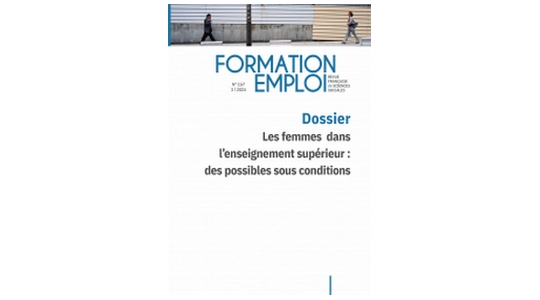- Beaupère, N., Érard, C., & Jaoul-Grammare, M. (Ed.). (2024). Les femmes dans l’enseignement supérieur : des possibles sous conditions (Special Issue). Formation emploi. Revue française de sciences sociales, (167), 7–13. Retrieved from https://journals.openedition.org/formationemploi/12842
This special issue focuses on female students in higher education today, reflecting on the “unfinished revolution” studied by a part of the Higher Education Working Group (GTES) (Céreq Echanges, No. 21, December 2023). Their paths are examined through the lens of “possibilities under conditions,” with a triple focus: 1) moving away from constant comparisons with men to highlight the diversity of female students’ paths based on social origin, education, and life conditions, 2) adopting a longitudinal perspective from secondary education to professional insertion, and 3) focusing on women whose paths are historically minority (e.g., in Sports Science, doctoral studies, or international mobility). The issue explores the specific challenges and risks these women face, with historical references to pioneering women like Madeleine Brès, the first female doctor of medicine.
- Érard, C., & Guégnard, C. (2024). Sportives à l’université : des possibles sous gages. Formation emploi. Revue française de sciences sociales, (167), 15–34. Retrieved from https://journals.openedition.org/formationemploi/12849
This article explores the lives of female university athletes, considering their participation in sports as a key element of their academic and personal paths. While some choose Sports Science (STAPS) courses, others combine high-level sports with university studies in different fields. The study examines the challenges these students face, including social pressures, parental expectations, and support from both the academic and sports worlds. Despite facing restrictions, these students demonstrate “discreet insubordination” that contributes to a “respectful revolution” in the university and sports spaces, which traditionally resist women’s inclusion.
- Vallot, P. (2024). « Petites mains », mais grandes études. Le déclassement ordinaire des femmes immigrées en France hexagonale. Formation emploi. Revue française de sciences sociales, (167), 143–167. Retrieved from https://journals.openedition.org/formationemploi/12917
Based on the Emploi surveys (Insee, 2003-2012) and Trajectoires et Origines (Ined, Insee, 2008), this article focuses on the “downward mobility” of female higher education graduates aged 25-55 who have immigrated to France. These women often end up in low-skilled jobs, despite early exposure to the French language, particularly those from Central-West Africa. The study identifies disparities based on the region of origin, with women from West Africa experiencing the highest levels of downward mobility, compared to Maghrebi and Eastern European women. Factors such as educational hierarchy between countries, as well as exposure to administrative insecurity and racial discrimination, contribute to explaining these discrepancies.
